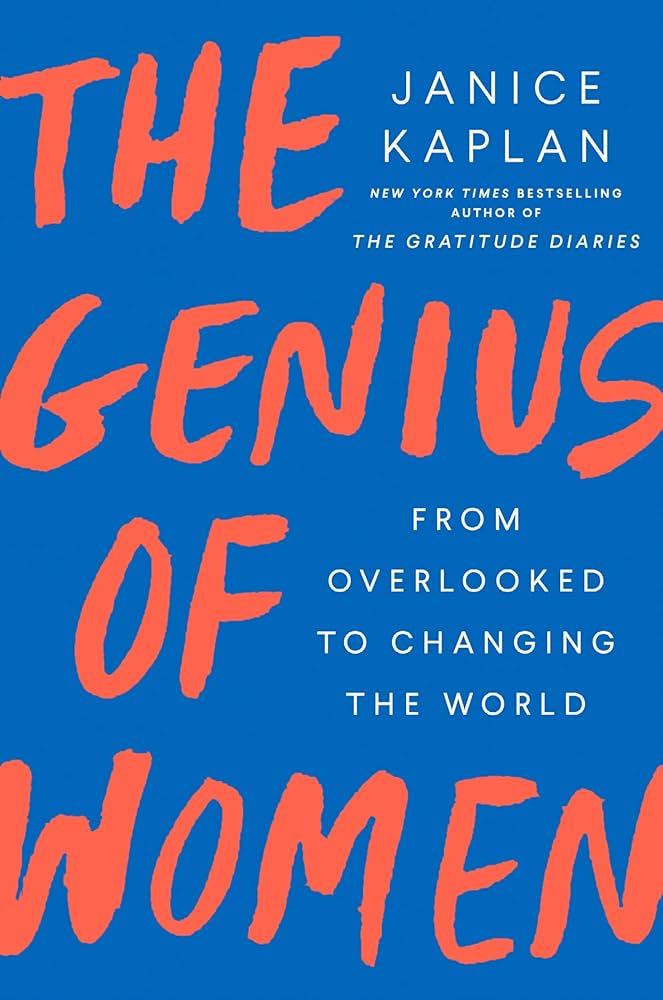Review by Nicole Louie
Thirsty for knowledge about women in history, I was drawn to Janice Kaplan’s The Genius of Women. Kaplan’s extensive pursuit to pay tribute to overlooked women spans 352 pages. She starts the book by narrating interviews with academics in various fields to learn if genius equates to intelligence, and introduces readers to the history of intelligence assessment, which has included skull shape, brain mass measurement, genetics, and IQ tests. Her exploration leads readers to the alarming realization that so much of what we call intelligence is based on assumptions rarely challenged and often regurgitated until perceived as truth.
Kaplan then ponders over the scarcity of female geniuses:
“In our current era of assumedly aroused consciousness to gender issues, why do both men and women still assume that men’s contributions to society are the ones that really count? We define genius almost exclusively through male achievement. When asked to name a genius, people mention Albert Einstein, Leonardo da Vinci, and Steve Jobs. As for great women? In one survey, the only female genius anyone listed was Marie Curie.”
In her continuous search for answers, she repeatedly encounters gender bias and explores how this attribution of genius to males is mainly due to the lack of visibility given to women’s lives, abilities and achievements. How can we know about female achievers if their achievements are not recognized or made known?
Examples of gaps in interest when it comes to registering women’s stories spotlighted in this book are: Guerilla Girls (a group of feminist art activists shaking up the art world since the 1980s) pointing out that less than 5% of the artists in the modern art section of the Met Museum were women; the number of Wikipedia pages about female figures being around 15%; and the obituaries about women in The New York Times making up for only 10% of the diseased people profiled.
The misogyny in Disney tales, such as the little mermaid who trades her voice for legs so she can conquer a handsome prince, and Princess Elsa’s coercion into believing she must contain the powers rooted in her hands by wearing gloves, is also mentioned as a way of normalizing the silence about women’s skills and legacy. Kaplan affirms that “once we expect to see women’s genius on display, the lack of it seems wrong and inexplicable,” and from that point onwards, she concentrates on filling in some of these gaps. That’s when we reach the peak of her research and learn more about a brilliant cast of women, such as Donna Strickland, Maria Anna Mozart, Fanny Mendelssohn, Ada Lovelace, Diane Arbus, Kathrine Switzer, Jane Goodall, Fei-Fei Li, Mayim Bialik, Frances Arnold and Mileva Marić-Einstein, among others who were not yet given the recognition they deserve or to whom the recognition came only when they were no longer alive.
On those pages, remarkable women from art, science, technology, math, literature and psychology are celebrated not as mothers, wives or assistants of male geniuses but as geniuses in their own right. Readers understand that genius doesn’t equate to intelligence or talent; genius surfaces from a combination of curiosity, determination, confidence, fearlessness, support, encouragement, opportunities, and external acknowledgment of talent.
Although the narrative sometimes centers too much on the author’s personal stories instead of on the women she sought in history and real life, when I finished the book I was left with the importance of Kaplan’s insightful observation that, “The genius of women might be to recognize the genius of other women. Because if we wait for men to do it, we could be waiting a long time.” Thanks to her book, many women will come to mind the next time I think about geniuses.
*******************
Thank you, Nicole!

Nicole Louie is a writer and translator based in Ireland. Her essays and poems have appeared in Oh Reader magazine, Loft, What’s the Theme Zine, among others. You can find her on Twitter and Instagram: @bynicolelouie. Her first book, Others Like Me: The Lives of Women Without Children is out in June.





